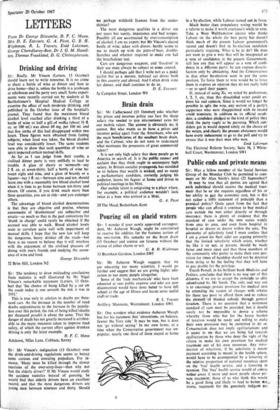Sir: One wonders what evidence Auberon Waugh has for his
statement that 'abstentions, on balance, favour the Tory side.' It may be true, but it does not 'go without saying.' In my own home, at a time when the Conservative government was un- popular, nearly one third of them stayed at home in a by-election, while Labour turned out in force.
Much better than compulsory voting would be a reform to make it worth everyone's while to vote. Take a West Walthamstow elector who thinks Labour on the whole the best party but doesn't think much of the present Labour government's record and doesn't find its by-election candidate particularly inspiring. What is he to do? He does not want to give a vote that will be interpreted as a vote of confidence in the present Government. still less one that will appear as a vote of confi- dence in a different party; he can express dissatis- faction only by abstaining. And the Conservatives in that other by-election were in just the same position. To force them to vote would be to force them to express an opinion they do not really hold —or to spoil their papers.
If, instead of using .Xs. we voted by preferences, 1, 2, 3, etc, then this dissatisfied voter could ex- press his real opinion. Since it would no longer be possible to split the vote, any section of a party's supporters who were disappointed with its record could nominate, in addition to its official candi- date, a candidate pledged to the kind of policy they think the party ought to be pursuing. Which can- didate got in would depend solely on the choice of the voters, and dearly the ,present abstainers would have every inducement to go to the poll and try to ensure that it was their man who won.
Enid Lakeman The Electoral Reform Society, Suite 56, 3 White- shall Court, Westminster, London SW1


































 Previous page
Previous page